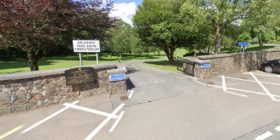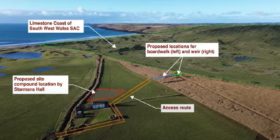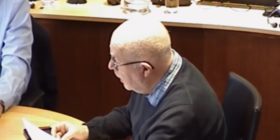Swansea University Cyberterrorism Researcher Lectures At NATO Centre Of Excellence

Swansea University Cyberterrorism researcher David Mair has recently returned from Ankara in Turkey, where he delivered a lecture at a NATO Advanced Training Course on Terrorist Use of Cyberspace.
David, aged 27 originally from Glasgow, who is a PhD Student in the College of Law and Criminology, recently returned from Turkey where he was an invited lecturer at the NATO Centre of Excellence Defence Against Terrorism (COE-DAT) Advanced Training Workshop on Terrorist Use of Cyberspace for the fifth time. The course featured 15 speakers from 9 countries. Mr Mair was the sole UK lecturer at this course.
The centre, NATO’s only accredited centre of excellence in defence against terrorism, played host to over 60 participants drawn from 16 countries, including Albania, Australia, Bahrain, Canada, Czech Republic, Estonia, Finland, France, Germany, Macedonia, Poland, Romania, Turkey, Ukraine, UK and the US. In addition, this course was attended by prominent NATO HQ personnel, including Rear Admiral (US-N) Peter Gumataotao, Deputy Chief of Staff, Strategy and Policy, for NATO Supreme Allied Commander Transformation (SACT) who addressed the participants on the future of terrorist use of technology and the ways that the NATO alliance can counter this.
Course director, Colonel Murat Aydin of the Turkish Army said; “Though it hasn’t been too long time since I took over the responsibility of this course, I dare say this course is getting better and better each time thanks to the highly remarkable contributions of experts & academicians. Furthermore, considering the recent unscrupulous bombing in Ankara just before our activity, the presence and support of this distinguished group has been much more meaningful than it ever has.
It is certain that as academicians, decision-makers, strategy-builders, we need to put much effort into struggling against all types of ill-mannered ideologies and any sort of opportunist approaches that are deprived of sincere concern for wisdom and humanity. This idea is the most significant motivation urging me to do my best for the beneficial and fruitful performance of the “Terrorist Use of Cyberspace Course”. Because I believe that as the good men of the world, if we fail in earning ourselves and our environments the essential knowledge in addition to human love, ethics, respect for the others, some “others” will then succeed in teaching the contrary. In case of such a failure, we may find ourselves together in a sinking boat no matter who has what in mind or in hand.
To conclude, we are under an inevitable obligation to build constructive networks against destructive ones. I am of course aware that our part requires us to put much more effort than terrorists since destroying is always & unfortunately easier than building within a pragmatist perspective. But I think staying on the right side and having a deep and sincere concern for the humanity will make us feel more comfortable and the good will win sooner or later. ”
Mr Mair’s lecture focused on terrorist use of social media; a topic he has recently published on in a prominent Terrorism Studies journal; Studies in Conflict and Terrorism and on which he is basing his PhD studies.
Speaking following the course, Mr Mair said; “The NATO COE-DAT Advanced Training Courses are an excellent opportunity for researchers and military personnel to come together and discuss the threats posed by terrorist groups and their use of advanced (and not-so-advanced) technology. I have been fortunate enough to have been invited back to the Centre to update the course on my ongoing research into terrorist use of social media and I always find the courses to be an engaging, challenging and valuable opportunity. I am very grateful to NATO COE-DAT and Swansea University for facilitating my attendance at this ATC.
Unfortunately, terrorist groups are a constant threat in today’s world as demonstrated by the recent and deplorable bombings in Turkey. My research shows that terrorist groups are utilising the internet daily as a vehicle for propaganda and denying these groups the ‘oxygen of publicity’ is becoming an increasingly challenging operation. Through a detailed analysis of the mechanisms through which propaganda is disseminated and the narrative which is produced, it is, however, possible to identify core counter-narratives and suitable policy implementations that can neutralise the power of terrorist propaganda and disrupt the effectiveness of terrorist use of the internet.”
Spotted something? Got a story? Email News@News.Wales











